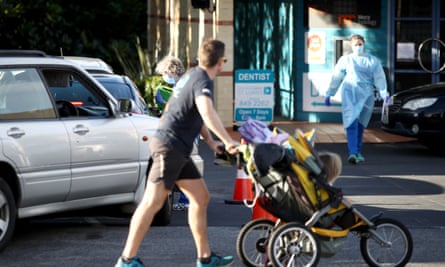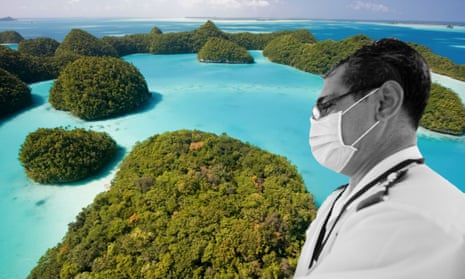Here is the latest news about the Covid-19 outbreak across the Pacific, from Dan McGarry and Tess Newton Cain on Wednesday 24 June.
The total number of cases of Covid-19 infection listed by the World Health Organization for the region stands at 352, an increase of 38 since last week – a reminder that although infection rates may be slowing in the region, the crisis is far from over.
US inability – or unwillingness – to cope with coronavirus is affecting the Pacific. A spate of new cases have been reported on Guam’s largest air force base.
This raises fears not only in the north Pacific, where travellers from the US have been responsible for every new case for more than a month, but for tourism-dependent countries including French Polynesia, Fiji and Cook Islands.
Concerns are rising throughout the Pacific that governments are not doing enough to safeguard civil liberties or to respect fundamental democratic principles.
Some argue that ‘securitisation’ of the Covid-19 response has provided Pacific leaders with the means to indulge autocratic tendencies. The prolonged states of emergency in several nations have raised constitutional questions.
New Zealand’s travel bubble ambitions have deflated somewhat. The confirmation of new cases and questions about apparent laxity at the border have dampened enthusiasm for a Pacific bubble, particularly in Samoa.
This has not yet slowed efforts to return thousands of seasonal workers to their home countries.
Fiji has announced a “Pacific pathways” corridor that could allow travellers from Kiribati, Tonga and Tuvalu to enter the country. Travellers will spend 14 days in quarantine at their own expense. Officials suggest Fiji could become a regional quarantine hub.
Its prime minister, Frank Bainimarama, has also advised that senior health officials are in talks with Australia and New Zealand to develop a “bula bubble” that will allow a restart for tourism.
The governments of Fiji and Samoa have reiterated that even though the impacts of Covid-19 are severe, climate change remains the No 1 challenge in the Pacific islands region.

What has happened this week?
● Guam: Even as businesses and social venues began to reopen, the island was hit with 35 new cases, all of them on Andersen air force base, and all apparently originating from a single air force unit deployed to Guam on 25 May. The US is the single largest source of infection in the northern Pacific territories. A number of studies indicate that Pacific islanders living in the US are more likely to contract the disease than other ethnic groups, and are more likely to suffer negative outcomes as well.
● US: Further evidence has emerged that Pacific islanders are suffering disproportionately in the US because of Covid-19. Marshall Islanders compose only 3% of the population of north-west Arkansas, a local newspaper reports, but half of all deaths from the disease are among this population.
● West Papua: The Jakarta Post records a total of 1653 cases in the Papuan provinces, with 10 deaths. Four prisoners who had been isolated because of Covid-19 fears managed to break down the bars on the windows of their hospital room and escape, authorities reported.
● Papua New Guinea: One new case has been confirmed, bringing the total for PNG to nine, with no deaths. The infected person is a member of the Australian defence force who has been resident in Port Moresby since January, making this likely to be a case of local transmission.
● French Pacific territories: The number of infections is unchanged at 21 for New Caledonia and 60 for French Polynesia. An eighth repatriation flight has brought nearly 200 people to French Polynesia from France.
● North Mariana Islands: The number of confirmed cases remains unchanged at 30.
● Fiji: There have been no new cases reported, leaving the country with a total of 18. In an effort to chart a course out of the Covid-19 economic downturn, the government is also seeking to establish “blue lanes” for pleasure sailing craft, including super yachts. Cruise ships are still banned.
● Solomon Islands: There are no cases of Covid-19. Only seven Solomon Island nationals remain in quarantine.
● Tonga: Testing facilities have been opened in Nuku’alofa. Repatriation flights of groups of 50 Tongans are expected to start next month from New Zealand. An estimated 7,000 Tongans are stranded overseas and 2,000 have registered for repatriation.
● Vanuatu: The NZ air force has started flights to repatriate some 1,000 ni-Vanuatu seasonal workers. All are required to undergo 14 days in quarantine on arrival before they can rejoin their families.

What are Pacific governments doing?
● Kiribati: Covid-19 does not seem to have suppressed turnout as the country voted in presidential elections. At stake was whether Kiribati keeps its new allegiance with China, or whether it would revert to its historical ties with Taiwan. The election was won by the pro-China candidate Taneti Maamau with 26,053 votes to Banuera Berina’s 17,866.
● Papua New Guinea: After the announcement of a ninth case, the government has announced that anyone boarding a plane to Port Moresby must show evidence of a negative Covid-19 test in the preceding 14 days.
● Bougainville: Authorities were unable to enforce state-of-emergency regulations around public gatherings and social distancing as people took to the streets to show support for candidates in the upcoming presidential and legislative assembly elections.
● Fiji: Restrictions have been eased further. The curfew has been shortened, beginning at 11pm and ending at 4am. Public gatherings of up to 100 people are now permitted. Senior school students will return to classrooms on 30 June, with other students to follow on 6 July.
● Vanuatu: An amendment passed while the entire opposition was under suspension empowers the government to extend a state of emergency indefinitely. The government has announced a number of repatriation flights for residents and citizens wishing to return from Australia.
● Solomon Islands: The government is considering establishing a second quarantine facility on the western border with Bougainville.
● Cook Islands: The prime minister, Henry Puna, told the media that although his nation was concerned by the announcement of new Covid-19 cases in New Zealand, it would still open its borders to New Zealanders and to residents who have been in that country for at least 30 days.
● Samoa: The prime minister has indicated that returning seasonal workers and citizens who have been overseas for medical treatment may soon be allowed to quarantine in their homes.
● New Caledonia: The period of mandatory quarantine for people arriving from overseas has been reduced from three weeks to two.
● French Polynesia: President Edouard Fritch intends to travel to Paris next month to negotiate up to US$525m in Covid-19 assistance funding. About $375m would go to government administration, and the remainder would be used for welfare payments.
● Federated States of Micronesia: Japan has offered US$3.5m to allow the FSM to buy medical equipment.

Australia and New Zealand
In Australia the number of new cases has risen to 7,641, which is an increase of 308 from last week. The number of deaths remains unchanged at 102. In New Zealand, the number of confirmed cases has increased from 1,156 to 1,163 with 22 deaths.
What did they say?
We’re talking about a pandemic, but … climate change impacts us in all aspects of our lives, including health as well.
– Fiame Naomi Mata’afa, deputy prime minister of Samoa
Good news
A Tuvaluan family of four whose globe-trotting adventure was interrupted by the virus have maintained their sunny disposition despite being locked down for months in an apartment in Casablanca.
They had visited 38 countries already, living off their savings and doing voluntary work wherever they went. They were visiting Morocco on a whim when borders closed. “I don’t want this journey to end, to be honest,” the husband, Bill, told TVNZ when asked if he was anxious to return home.
Infection and fatality figures in this article are valid as of June 23. They are based on WHO daily situation reports, and supplemented in some cases by national government updates.
